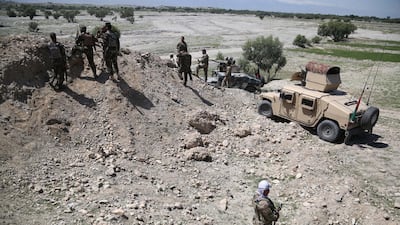The increasing pace of negotiations between the United States administration and the Taliban had renewed hope among many Afghans that perhaps an end to decades of war in Afghanistan may finally be in sight.
For those observing the developments of the last few months, one of the sure signs that negotiations were moving to a desired conclusion is the announcement of a ceasefire between the warring parties.
But, in a surprising move last week, the Taliban instead declared the launch of another fighting season, or spring offensive.
Fighting season typically starts in the spring at the end of the harsh winter and lasts for five months through the summer.
Many Afghans, particularly those in the security services, let out a collective, frustrated sigh at the group’s announcement, according to one Afghan army commander from a northern province of the country.
"We opened our arms for the Taliban when they came with the message of peace," the 37-year-old soldier told The National, on condition of anonymity, referring to the brief, albeit, historic three-day ceasefire held during Eid in June last year.
“We were hopeful that as a nation we had showed them that we only want to peace, but it seems to me that they don’t have the power to choose peace in their own hands, even if they want to,” he said.
An attack on the communications ministry in Kabul on Saturday, which left at least eight people dead, raised fears of Taliban involvement but the group denied any role. It still highlighted the threat of insecurity as peace talks continue.
The soldier said that, irrespective of whether the Taliban pursued conflict or dialogue, Afghan forces were prepared to tackle the upcoming offensive.
Operation Khalid is the Afghan government’s security plan launched earlier this month. It is aimed at improving the security situation in the country, and redeploying capacities to urban centres, highways, and other strategic areas, while implementing additional security measures for the much delayed presidential elections scheduled for September.
The Taliban said in its statement that their announcement of a fresh fighting season was in response to the Afghan government’s Operation Khalid. But analysts who have been monitoring the situation disagreed with that version of events.
“The Taliban prepare for a spring offensive as early as January," said Hekmat Azamy, deputy director at Centre for Conflict and Peace Studies, a Kabul-based think tank.
"They reshuffle members within the group; experienced military commanders are promoted and sent to areas where they can perform better.
"The preparations include not only their own military structure but also aligning with other groups that are transnational, seeking their support for a fully fledged operation.
“It is incorrect that they only just decided to announce it in response to the Afghan government’s operation. The preparation for this are extensive and have already been underway.”
Mr Azamy speculated that the Taliban leadership was likely waiting to see how their latest round of talks with the Americans progressed before announcing the offensive.
According to Thomas Ruttig, co-director of Afghanistan Analysts Network, the onus of the sustained fighting also falls on foreign and Afghan forces.
"The US and Afghan forces have intensified air strikes, night raids and house searches, which proves this is the same logic that has been ruling the conflict for a decade – that the parties to the war find talking and fighting is possible at the same time, and that military progress might strengthen their position if it comes to negotiations," he told The National.
Agreeing with Mr Ruttig, the Afghan commander admits that increased military pressure will improve their position in the negotiations but says the battles are only taking place because of the Taliban.
“The Taliban fight so they can have an upper hand in the talks but we fight against those who are hurdles to peace,” he said.
Mr Azamy predicted that the situation would deteriorate “beyond our imaginations” as fighting escalates.
“Provinces are expected to fall and unfortunately it is not going to be easy. For the Taliban, this will allow them to apply pressure on the Americans to reach to a deal more quickly,” he warned.
“From what I understand, their 2019 agenda will be focused on gaining more territory, because during the talks in Qatar, they’ve claimed that they control over 70 per cent of Afghanistan and they would want to make that a reality this year,” Mr Azamy said, adding that certain provinces remain more vulnerable than others.
He said that the Taliban cannot hold on to a province “for more than a week” and only choose targets for specific reasons, such as having Taliban fighters in prison or if ammunition and weapons are an easy target to recoup.
Meanwhile, the prospect of an actual ceasefire has dimmed. Analysts also predict a violent year ahead, and urge all sides to reduce casualties.
“The government and the US could go for a unilateral ceasefire and declare they will only react when attacked. This could possibly freeze the situation,” Mr Ruttig suggested.
The Afghan Army commander, who has been fighting for the last thirteen years, is not holding his breath, though.
“It is my only wish to embrace peace, but if the Taliban bring us war instead of peace, we will keep fighting the enemies,” he said.

